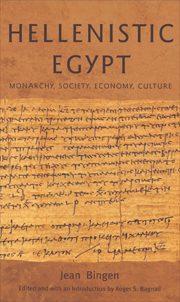Book contents
- Frontmatter
- Contents
- Original Sources of Chapters
- List of illustrations
- Glossary
- Maps
- Foreword
- Introduction: Jean Bingen and the currents of Ptolemaic history
- Part I The Monarchy
- Part II The Greeks
- Part III The Royal Economy
- Part IV Greeks and Egyptians
- 16 Greek economy and Egyptian society in the third century
- 17 Greeks and Egyptians according to PSI V 502
- 18 Graeco-Roman Egypt and the question of cultural interactions
- 19 Normality and distinctiveness in the epigraphy of Greek and Roman Egypt
- Conclusion
- Bibliography
- General index
- Index of passages discussed
- HELLENISTIC CULTURE AND SOCIETY
17 - Greeks and Egyptians according to PSI V 502
from Part IV - Greeks and Egyptians
- Frontmatter
- Contents
- Original Sources of Chapters
- List of illustrations
- Glossary
- Maps
- Foreword
- Introduction: Jean Bingen and the currents of Ptolemaic history
- Part I The Monarchy
- Part II The Greeks
- Part III The Royal Economy
- Part IV Greeks and Egyptians
- 16 Greek economy and Egyptian society in the third century
- 17 Greeks and Egyptians according to PSI V 502
- 18 Graeco-Roman Egypt and the question of cultural interactions
- 19 Normality and distinctiveness in the epigraphy of Greek and Roman Egypt
- Conclusion
- Bibliography
- General index
- Index of passages discussed
- HELLENISTIC CULTURE AND SOCIETY
Summary
One of the fundamental problems of papyrology is that posed by the cultural contact that arose from the settlement of Greeks in a traditional Egyptian milieu. Those Greeks, even after losing their original social roots, were bearers of political and economic traditions ready to be used in the particular dynamics of immigration. The problem, like any sociological problem, is complex, because neither the Greek nor the Egyptian milieu was homogeneous and closed. Except in some domains, however, mixing of their cultures was not extensive. Cultural ‘borrowing’ was instinctively limited by the privileged minority; it was also restricted, unconsciously, by an Egyptian majority which used a certain cultural solidarity to resist its own incapacity to compete with the Graeco-Macedonian minority. Greek settlements did not follow any fixed formula, and even the new polis of Ptolemais surely did not imitate the types of installation achieved in Naucratis or Memphis in very different historic conditions. The initial period of military occupation was followed, except for the more or less urbanised areas, about which we are poorly informed for the Ptolemaic period, by the rather classic stage of cleruchic settlement and that of the development of a royal network of administration of the country, a network directed from above in the milieu of the court in Alexandria. The monopoly which the Greeks possessed, of what I would call ‘the dialectic of administration and of monetary economy’, gradually assured to the Hellênes of the Macedonian royal system at first the occupation of power, then a dominant position in the use of land and availability of capital.
- Type
- Chapter
- Information
- Hellenistic EgyptMonarchy, Society, Economy, Culture, pp. 229 - 239Publisher: Edinburgh University PressPrint publication year: 2007



